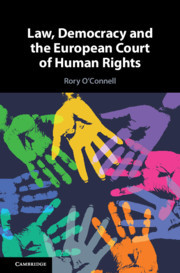Description
Law, Democracy and the European Court of Human Rights
Author: O'Connell Rory
Explores how the European Court of Human Rights understands 'democracy' and might support more deliberative, participatory and inclusive practices.
Language: English
Subject for Law, Democracy and the European Court of Human Rights:
Approximative price 102.80 €
In Print (Delivery period: 14 days).
Add to cart
Publication date: 11-2020
Support: Print on demand
Support: Print on demand
Description
/li>Contents
/li>Biography
/li>
Law, Democracy and the European Court of Human Rights examines the political rights jurisprudence of the European Court of Human Rights. It discusses how the Court supports a liberal representative and substantive model of democracy, and outlines the potential for the Court to interpret the Convention so as to support more deliberative, participatory and inclusive democratic practices. The book commences with an overview of different theories of democracy and then discusses the origins of the Council of Europe and the Convention and presents the basic principles on the interpretation and application of the Convention. Subsequent chapters explore issues around free expression, free assembly and association, the scope of the electoral rights, the right to vote, the right to run for election and issues about electoral systems. Issues discussed include rights relating to referendums, voting rights for prisoners and non-nationals, trade union rights and freedom of information.
Introduction: 1. Theories of democracy; 2. Council, convention and court: origins and evolution; 3. European principles of interpretation and application; 4. Freedom of expression; 5. Association, assembly and political parties; 6. Scope of the electoral rights; 7. The right to vote; 8. The right to run for election; 9. Regulation of elections; Conclusion: Deliberation, inclusion and participation; Bibliography; Index.
Rory O'Connell is Professor of Human Rights and Constitutional Law at the School of Law & Transitional Justice Institute, Ulster University; from 2014–2020 he was the Director of the Transitional Justice Institute. He is a member of the Executive of the Committee on the Administration of Justice, a member of the Global Challenges Research Hub on Gender, Justice and Security and a former member of the BrexitLawNI ESRC project on the constitutional, legal, human rights and equality aspects of Brexit for Northern Ireland.
© 2024 LAVOISIER S.A.S.




